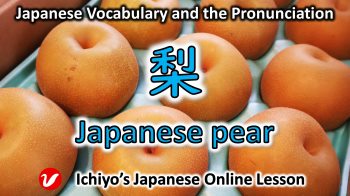The Japanese vocabulary「梨 (なし、ナシ、nashi)」means “Japanese pear.” Please learn the pronunciation and the example sentences.
Japanese Vocabulary and the Meaning
| Key Word | 梨、ナシ |
| Hiragana | なし |
| Romaji Reading | nashi |
| English Meaning | Japanese pear |
The Correct Japanese Pronunciations
Please learn the pronunciation by watching the attached video. You can also learn example sentences.
Our main YouTube channel: Ichiyo’s Japanese YouTube Channel
Our sub-YouTube channel (Japanese vocabulary videos): Ichiyo’s Subchannel
The Example Japanese Sentences
It is important to have skills in both non-honorific and honorific languages in order to use Japanese correctly.
The texture of Japanese pears is crunchy.
Plain Form:
梨の食感はシャリシャリしている。
Nashi no shokkan wa sharishari shite iru.
Polite Form:
梨の食感はシャリシャリしています。
Nashi no shokkan wa sharishari shite imasu.
I often eat pears in the fall.
Plain Form:
秋になると梨をよく食べる。
Aki ni naru to nashi o yoku taberu.
Polite Form:
秋になると梨をよく食べます。
Aki ni naru to nashi o yoku tabemasu.
Have you ever tried pear juice?
Non-Honorific and Spoken Language:
梨のジュースを飲んだことがある?
Nashi no jūsu o nonda koto ga aru?
Polite Form:
梨のジュースを飲んだことがありますか。
Nashi no jūsu o nonda koto ga arimasu ka.
Pears taste even better when chilled in the refrigerator.
Plain Form:
梨を冷蔵庫で冷やすとさらに美味しくなる。
Nashi o reizōko de hiyasu to sarani oishiku naru.
Polite Form:
梨を冷蔵庫で冷やすとさらに美味しくなります。
Nashi o reizōko de hiyasu to sarani oishiku narimasu.

